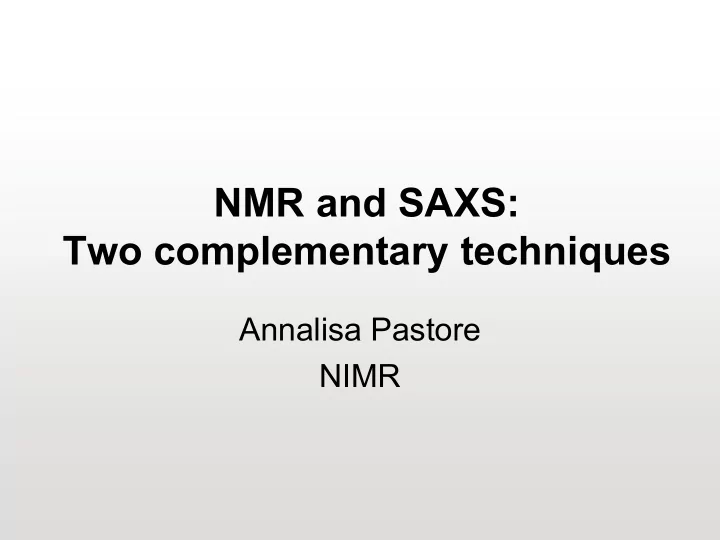

NMR and SAXS: Two complementary techniques Annalisa Pastore NIMR
A bit of NMR history
Nuclear Magnetic Resonance 1 Gauss 23.5 Tesla Circa 500.000 times >>
The magnetic field removes the degeneracy of the nuclear spin levels
NMR as a radio… Tune the frequency to observe a certain… element….
The 1H spectrum of a protein The position of each peak on the spectrum is called chemical shift
A 13C spectrum
We can mix the channels Excite one nucleus, transfer the magnetization to another, and than back to the first
You may gain resolution increasing the dimensions Like a 2D Gel The fingerprint
Chemical shift perturbation as a tool to map interactions… Sensitivity to the chemical environment
It is used to study proteins because: • Structure determination in solution • Intermolecular interactions • Dynamics • Weak interactions
The linewidth is roughly proportional to the tumbling time in solution We are limited in the molecular size we can afford…
A cut-and-paste approach SAXS can help…
A pact of friendship... NMR SAXS
The example of frataxin
Friedreich’s ataxia A lethal neurodegenerative disease • Is the most frequent hereditary ataxia • 1 in 50,000 affected individuals but (being recessive) • 1 in 120 carriers in European population!!! Associated with: – Progressive gait and limb ataxia – Lack of leg reflexes – Disarthria – Diabetes mellitus • Death often caused by cardio-hypertrophy
The Frataxin iron binding site is only composed of Glu and Asp Fe titration of frataxin A rather unsual coordination! Nair et al. (2004) Structure 12, 2037.
What is frataxin function? A thick fog…
Increasing evidence links frataxin to Fe-S cluster assembly… GST-pull down Bioinformatic evidence Huynen et al. (2001) Hum. Mol. Genet. 10, 2463-2468 Genetic and biochemical evidence Gerber et al. (2003) EMBO reports 9 , 906 Layer et al. (2006) JBC 10,1074 Muhlenhoff et al. (2002) EMBO J. 22, 4815 Ramazzotti et al. (2004 ) FEBS Lett. 557 , 215 Yoon and Cowan (2003) JACS 125, 6078
Iron sulfur clusters Iron sulphur clusters are the eldest response to the problem of storing iron and sulfur in a non-toxic form
Fe-S assembly is centred on a desulphurase and a transient acceptor 2Cys 2Ala + S-S Converts Cys into Ala IscS dimer = desulphurase iscU iscU iscU Fe2+ + IscS IscS IscS Cys Ala
Protein interactions GST GST-CyaY Pull-down IscS - CyaY in vivo interacts with the desulfurase IscS. - IscU and CyaY bind to IscS but do not compete
We have the structures of all three components… What is the structure of the complex?
Getting crystals of IscS/IscU or IscS/frataxin complexes A different approach… based on NMR, SAXS and mutagenesis
The pipeline…
Frataxin and IscU do NOT compete for the same IscS surface 55 50 48 50 46 44 Fluorescence Fluorescence 42 45 - frataxin + frataxin 40 40 38 36 34 35 K d (IscU) = 0.9 +/- 0.4 µ M K d (IscU) = 1.2 +/- 2 µ M 32 30 30 0 5 10 15 0 5 10 15 [IscS] ( µ M) [IscS] ( µ M)
What are the consequences of these interactions? IscS-IscU 0.45 Kd=200 nM 0.3 Kd=1.5 µM 0.15 CyaY noCyaY 0 Addition of Cyay to IscS increase IscU affinity 0 100 200 300 400 500 600 [IscU] nM Addition of IscU to IscS increase CyaY affinity CyaY- IscS 3 Kd=35 nM 2.5 2 Kd=20 µM Synergic interaction!!! 1.5 1 noIscU 0.5 IscU 0 0 10 20 30 40 50 60 [IscS] μ M
SAXS (Small-angle X-ray Scattering)
SAXS to model the complexes This technique gives information on the shape and size of macromolecules We characterized the binary and tertiary complexes The envelops of the complexes are different from the one of single species Identification of the excess volumes for monomeric IscU and CyaY
How can we get the interaction surfaces? IscU IscS frataxin
The interacting surface maps onto a conserved region of Frataxin the residues involved are those necessary for iron binding!
HADDOCK calculations
Distance restraints
OUR SAXS + NMR model…
pdb : 3LVL
The crystal structure in our model…
The low resolution structure of the CyaY/IscS complex R220 R223 R225
The ternary IscS/IscU/CyaY complex The interaction is iron independent
Validating the model…
Only the IscS_I314E_M315E mutant does not bind to IscU
Only IscS_R220ER223ER225E mutant abolishes binding to frataxin
The whole pipeline
Saxs and NMR as complementary techniques! To model big multidomain proteins and complexes To validate a structure
The Isc proteins using E. coli as a model system Isc operon 2 IscS IscU IscA hscB hscA fdx YfhJ E. coli IscR Our ultimate aim is understanding the link between Fe/S formation and frataxin
IscX: 66 amino acid protein -> smaller than CyaY (106 residues) But, like frataxin, Highly acidic (PI=3.7) Binds to Iron Binds to IscS Competes with Frataxin on IscS
IscX binds IscS… in the same site as Frataxin
Two binding sites on IscS? 1:0 1:1 1:20 1:40 1:0 IscS:IscX CL CL CL CL -CL Cross-Linker 1 2 3 4 5 6 7 250 Maldi-TOF indicates both 150 1:1 52kDa and 60kDa 100 IscS:IscX complexes 75 50 Site 2 has a binding affinity 37 <<< lower than site 1 25
Can SAXS help also in this case? R220,223,225 R220,223,225 K4 K4 K101 K4
Problems… When we have a good fit the models do not agree with cross-linking The best models in terms of cross-linking have a poor fitting Can we do any better?
Acknowledgements Filippo Prischi, Salvatore Adinolfi, Clara Iannuzzi, Robert Yan, Rita Puglisi Peter Konarev and Dmitri Svergun (EMBL)
Recommend
More recommend